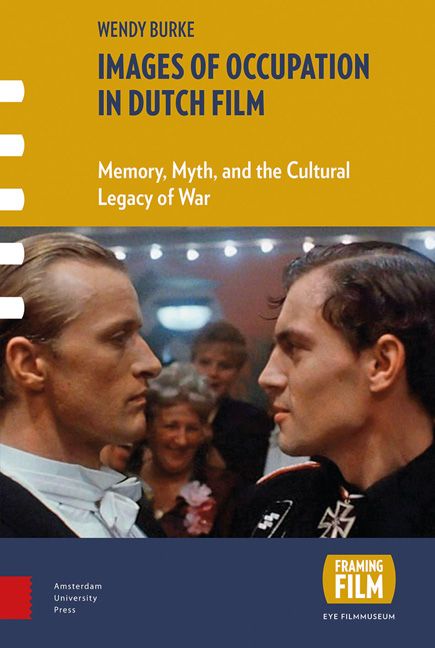Book contents
- Frontmatter
- Contents
- Acknowledgements
- Note on Translations
- List of Illustrations
- Dedication
- Introduction
- Chapter 1 Representation, Occupation, and Dutch War Films
- Chapter 2 The Image of the Enemy
- Chapter 3 Dutch Identity and ‘Dutchness’
- Chapter 4 Life Under Occupation
- Chapter 5 Resistance and Collaboration
- Conclusion
- Notes
- Filmography
- Bibliography
- Glossary of Dutch and German Terms
- Appendix Top dutch films by box office admissions
- Index
- Frontmatter
- Contents
- Acknowledgements
- Note on Translations
- List of Illustrations
- Dedication
- Introduction
- Chapter 1 Representation, Occupation, and Dutch War Films
- Chapter 2 The Image of the Enemy
- Chapter 3 Dutch Identity and ‘Dutchness’
- Chapter 4 Life Under Occupation
- Chapter 5 Resistance and Collaboration
- Conclusion
- Notes
- Filmography
- Bibliography
- Glossary of Dutch and German Terms
- Appendix Top dutch films by box office admissions
- Index
Summary
A Dutch middle-aged couple enter the headquarters of the Sicherheitsdienst (SD) in a district of Amsterdam. They walk across a marble floor to a soldier behind the reception desk. Several swastika flags hang in the foyer. The middle-aged woman tells the SD soldier that their neighbours’ belongings and furniture have been picked up. These neighbours were Jews. The couple's own bicycles were in their neighbours’ shed and these have also been taken. There is a moment's pause before she asks: ‘We happen to know where two Jews are hiding out… Can we get our bicycles back if we give up the two Jews?’ The soldier says that will not be possible, but the going rate for giving up a Jew is seven and a half guilders per Jew. She nods slightly and he hands her a form. She and her husband look at the form, look at each other, and nod their assent to each other.
Scene from In de Schaduw van de Overwinning (1986)This book examines shifting images of occupation in Dutch feature films about World War Two, with an emphasis on films made between the 1960s and the 1980s. It explores the complex, evolving role played by film within Dutch post-war cultural memory and asks to what extent film can represent and assimilate the experiences and collective legacies of war. The book views film as a cultural text—a representation of the past that reveals the concerns of society from the time it was made, whether this happens consciously or not. In this way, the Dutch films examined in this volume form part of collective social memory, bringing to light how Dutch society sees itself—or saw itself— during the decades after the war. Though its apparent subject is Dutch films with war as their theme, Images of Occupation in Dutch Film is at the same time an exploration of how the films of a nation re-tell the stories of its past.
The book argues for a progression from ‘black-and-white’ responses to Germany's 1940-1945 occupation of the Netherlands—reflected in the tendency in films of the early post-war decades to portray ‘good’ Dutch citizens against ‘evil’ occupiers—towards a much more nuanced, intricate image in later films of the moral choices faced by ordinary Dutch people during occupation.
- Type
- Chapter
- Information
- Images of Occupation in Dutch FilmMemory, Myth and the Cultural Legacy of War, pp. 11 - 22Publisher: Amsterdam University PressPrint publication year: 2017



